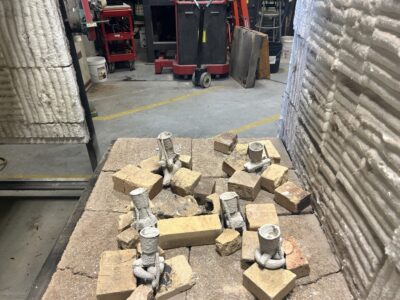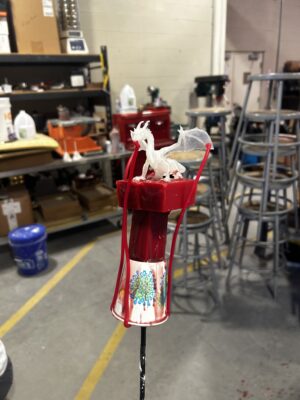Metallurgical Engineering Trades Apprenticeship & Learning (METAL) partners with the Foundry Educational Foundation (FEF) to help build the next generation of talent in U.S. manufacturing.
Established in 1947, FEF is the liaison between students, educators and industry leaders, ensuring young engineering talent enters the metalcasting industry. Today, it continues that mission by supporting scholarships, engineering programs and internships that shape the next generation of professionals in the field.
As part of this partnership, FEF has placed 24 interns from 10 universities in its first program phase and secured multiple industry partners to develop 10 more internships.
FEF Interns work on real-world projects, assist with student outreach and gain critical networking opportunities that help shape their careers.
Meet Ianto Woolridge
Through our collaboration with FEF, METAL supports students like Ianto Woolridge, a freshman at Virginia Tech majoring in Materials Science and Engineering.
As part of FEF’s internship placement program, FEF placed Ianto at Virginia Tech as a foundry intern specializing in investment casting using 3D-printed expendable molds. His regular duties include setting up gating, creating molds around cast patterns and sintering molds under the direction of Virginia Tech foundry director Dr. Alan P. Druschitz.
Woolridge joined FEF in the Fall of 2024 and has since gained valuable insights and direction for his future career. Here’s what he said about how his FEF program experience has shaped his academic and professional goals.
Q: Tell us about your experience in metalcasting since joining the FEF program.
A: The FEF internship was my first real exposure to metalcasting and it’s been such a valuable experience. I joined the program in the fall of my freshman year. At that time, I had no idea what to expect. I knew I was interested in materials science, but I hadn’t explored the practical side of how those materials are used in manufacturing. Getting into the foundry for the first time was eye-opening. I saw firsthand how raw materials are transformed into usable products and that hands-on experience helped me understand the purpose behind what I’m learning in class. It was a huge shift from theory to practice and sparked a genuine interest in metalcasting.
Q: What essential skills have you learned from your time in the university foundry lab?
A: One of the biggest things I’ve developed is my problem-solving ability, especially under real-world conditions. In the foundry, things don’t always go according to plan. Whether it’s issues with temperature control, molds, or unexpected results in the casting process, I learned how to stay calm and work through challenges methodically. I also developed better communication skills. I leaned heavily on seniors in the foundry who had more experience and they were incredibly supportive. Collaborating with them taught me to ask the right questions, learn from feedback and troubleshoot effectively. I know I’ll take these skills with me into any engineering or professional setting.
Q: How do you see your metalcasting experiences influencing your career path?
A: When I first came to Virginia Tech, my plan was straightforward: get a degree, go to graduate school, earn a PhD and work in a research lab. But the FEF experience shifted my perspective. Working in the foundry made me realize that I prefer hands-on, outdoor work where I can physically interact with materials and processes. I enjoy the energy of the foundry, the teamwork and the tangible outcomes. While I still value academic research, I now see myself pursuing a more applied role in the industry—something that blends engineering with real-time problem-solving and production.


Examples of Ianto Woolridge’s work as part of the Virgina Tech FEF Program
Q: In what ways has FEF supported your academic and industry experiences?
A: FEF has made a significant impact on both my education and my confidence as a student. Because I had early exposure to real casting and manufacturing techniques, I’ve felt more prepared and less intimidated by my coursework – especially in classes like manufacturing, where we’re expected to understand casting principles. That’s been a game changer for me. It’s one thing to study manufacturing, but it’s another to see and do it for yourself. FEF allowed me to apply what I’m learning and to connect the dots between theory and practice.
Q: What message would you share with supporters of FEF who help make these opportunities possible?
A: I can’t thank FEF and its supporters enough. Without the scholarship and the opportunity to get involved early in the foundry, I probably wouldn’t have discovered how much I enjoy this type of work. It’s not just about the financial support – though that certainly helps – it’s about being given a space to learn and explore. Because of this program, I’ve explored options for a future career after graduation. I hope donors and industry partners continue to invest in FEF because their impact on students like me is life-changing.
Q: What would you say to other students or the general public who may not be aware of opportunities in metalcasting or manufacturing?
A: There’s a gap in awareness. Many students go into engineering just thinking about high-paying jobs, but they often overlook careers in metallurgy or manufacturing. These fields are essential to the U.S. economy but don’t get the visibility they deserve. Programs like FEF help change that by exposing students to what these careers look like. They show us that hands-on, high-technology work in these industries can be just as impactful and rewarding as more traditional engineering paths.
Learn more about FEF’s programs and its mission here: https://www.fefinc.org/
